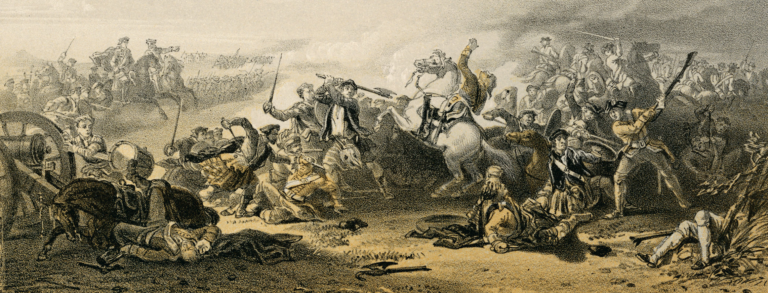Walter Scott & Revolution
An exhibition celebrating the 250th anniversary of Scott's birth.

Sir Walter Scott lived through an age of revolution, and his best-selling novels and poems are a vivid and powerful response to revolutionary change. Far from being an escape into a romanticized past, his works overflow with scenes of violence, terror, repression, and rebellion.
Scott’s worldview was shaped by the American Revolutionary War, the French Revolution, and the Irish Rebellion of 1798. Nearer home, the 1790s saw civil unrest throughout Scotland. Reformers demanded wider political representation and workers protested food shortages, rising living costs, and the effects of rapid industrialization.
With the defeat of Napoleon in 1815, Scott hoped that Scotland had entered a new era of tranquil prosperity. Instead, economic depression triggered fresh political agitation.
Learn more about Scott's revolutionary era
|
||||||
| Object reference | Malk.20 |
|---|
While his age is seen as the dawn of the British Empire, Scott himself was shaken by the crumbling of other age-old empires like the Spanish Empire in Latin America and the Holy Roman Empire in Central Europe.
He does not portray these events directly in his novels. Instead, he selects radically transformative periods in Scotland’s or Britain’s past and uses them to comment on the upheavals of his own day. Although Scott rarely alludes directly to contemporary events, his original readers would have read his poems and novels as a mediation of current tensions, hopes, and fears.
Learn more about the historical events that inspired Scott's novels
|
||||||
| Object reference | Coll-1022/CCWS/ILL/P.3610 |
|---|
A member of the prosperous middle-classes and no political revolutionary himself, Scott believed revolutions occurred when rulers failed to oversee gradual change and to meet legitimate political expectations. Irresponsive or inflexible governments provoked radicalization, turning reformers into fanatics, and mistreated workers into murderous mobs.
Scott’s fictional heroes point the ideal way forward, charting a perilous path between revolutionary and reactionary extremes.
Learn more about Scott’s revolutionary scenes and characters
|
||||||
| Object reference | Coll-1022/CCWS/ILL/P.2893 |
|---|
Scott’s works enjoyed equal or perhaps greater success abroad. In societies struggling for independence from regional superpowers, whose languages and cultures were repressed or marginalized, Scott’s depictions of rebellion struck a deep chord.
In Italy and Poland, Bohemia and Hungary, he was read as a defender of endangered traditions and as a model for a new national literature. In countries like France, Russia, and Spain, he was seen as a champion of cultural diversity, religious tolerance, and freedom of expression, whose works inspired fighters for civil rights and democracy.
Meet the revolutionaries Scott inspired abroad
|
||||||
| Object reference | Zs.12.34 |
|---|
